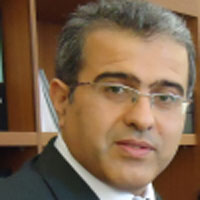Dipl. CEng., BEng (Honours) CEng., MSc Real Estate & Prop. M., MPhil , PhD Professor, Vice Rector for Academic Affairs Department of Civil Engineering and Geomatics Cyprus University Of Technology

Diofantos G. Hadjimitsis is the Vice Rector for Academic Affairs and Full Professor at the Department of Civil Engineering and Geomatics of the Cyprus University of technology. He was the Chair of the Department of Civil Engineering and Geomatics. He has more than 300 publications in journals, conference proceedings and chapters in books in the field of remote sensing, space applications, geo-information and GIS for environmental surveillance /environmental monitoring, geomatics and civil engineering. His research group consisted of more than 35 researchers and is the largest group at the University. Since his appointment at the Cyprus University of Technology (2007), he participated in more than 40 research projects with funding sources from the Cyprus Research Promotion Foundation, H2020, FP6, FP7, Eureka, Life +, EC regional funds, Erasmus and national funds. Diofantos has been a coordinator of more than 15 research projects.
He undertook his PhD and MPhil (1996-1999) in the field of Satellite Remote Sensing intended for water quality monitoring in water treatment reservoirs from the University of Surrey, Department of Civil Engineering (UK). His PHD has been sponsored from Thames Water Utilities (UK). During his doctoral studies he received an ORS Scholarship and a Faculty of Engineering Scholarship. He obtained a First Class BEng. (Honours) Degree in Civil Engineering from Surrey University (1994-1996). Diofantos was awarded the Felix Pulzer Memorial Prize (Surrey Univ.) and National Guard Prize (HTI). He obtained a First class HND Diploma in Civil Engineering from the Higher Technical Institute (1989-1992). Diofantos obtained a distinction MSc award in Real Estate and Property Management (RICS), from the University of Salford (UK) (2005-2007). Diofantos worked in the past at the University of Surrey (UK), University of Southampton (UK), Frederick University and in the industry.
Diofantos is a civil engineer and accredited valuator by profession and member of the Cyprus Scientific and Technical Chamber (ΕΤΕΚ) in both professional areas. Diofantos is a Senior Member of SPIE (has been elected from SPIE for the year 2014 for his achievements in Remote Sensing)
He is the member of the National Experts appointed by the Cyprus Government for investigating the potential of Cyprus to join the European Space Agency (ESA). He is the member of the editorial team of the MDPI Remote Sensing Journal, Heritage MDPI Journal, Open Geosciences etc.



